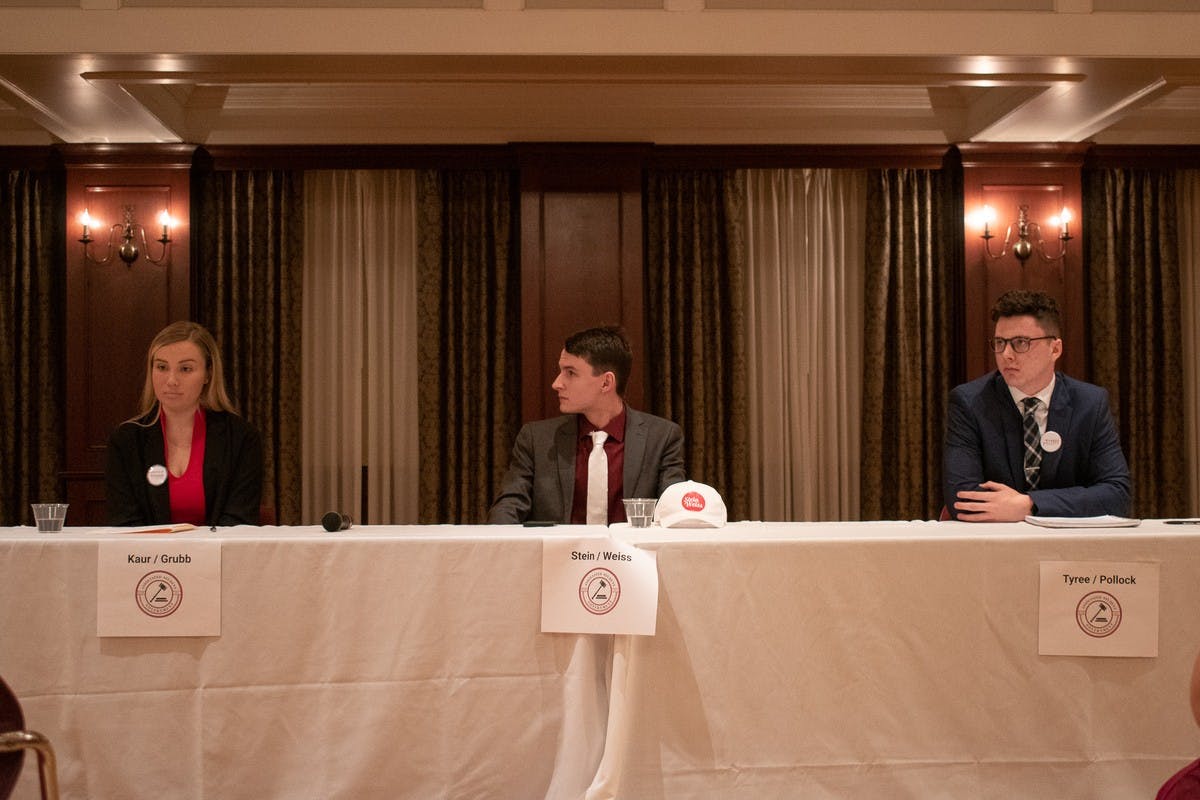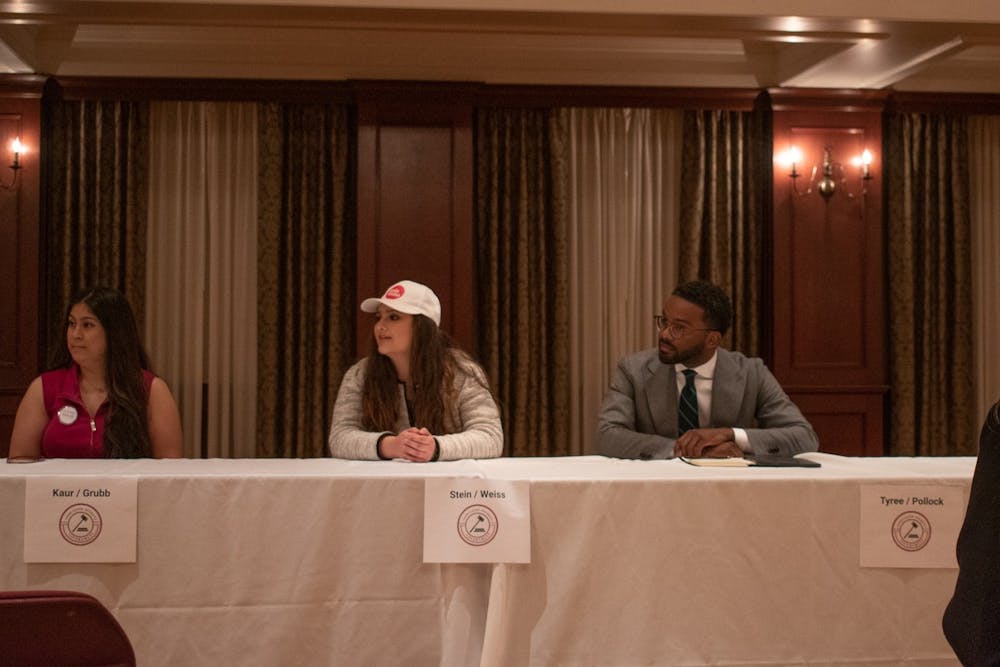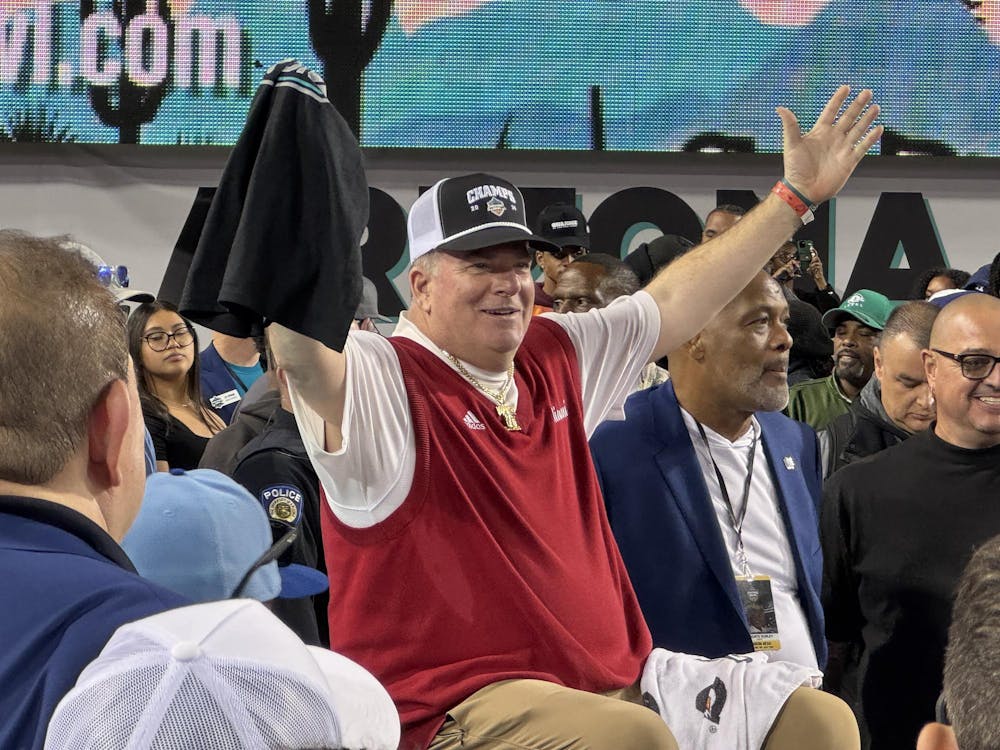Miami University’s Associated Student Government (ASG) held a debate between the candidates for Student Body President (SBP) and Vice President (VP) in the Shriver Center’s Heritage Room on Thursday, March 10.
The candidates are Amitoj Kaur (SBP) and Khenadi Grubb (VP), Danielle Stein (SBP) and Adam Weiss (VP), and Austin Tyree (SBP) and Dan Pollock (VP). The debate was moderated by Valeri Hernandez-Godinez, a member of the elections committee in ASG, and Madeline Phaby, a campus and community editor for The Miami Student.
After the three SBP candidates introduced themselves, they were asked what new initiatives they would seek towards bettering students’ mental health.
Kaur said she would not seek out anything new because Miami recently introduced a mental health fee. First-year students for the 2022-2023 academic year will see a $50 increase in their tuition, which will go toward hiring 70 counselors in Student Counseling Services (SCS).
As a former student trustee on the Board of Trustees (BoT), Kaur helped to write the proposal to get the fee enacted.
Kaur said she will continue to develop this initiative by making sure diverse counselors are hired and students know wait times will be down.
“As someone who goes to SCS myself, it was really important I had a woman of color be my therapist,” Kaur said.
Stein said she plans to have resources available for students who may struggle with addiction. She said she would add addiction resources to Student Health Services (SHS).
“We want to make sure that we’re being realistic – maybe a section of Harris Hall specialists that are trained to deal with that type of thing,” Stein said.
Tyree said he would push to get more counselors in SCS like Kaur said, but also create more student organizations focused on mental health.
“Let [students] have an outlet to release some of the things that they’re going through,” Tyree said. “It’s very important that we’re pressing the university to make sure that this is the forefront that we’re doing because it’s important. So many lives have been affected by mental health.”
Candidates were then asked what an academic policy they would advocate for would be.
Enjoy what you're reading?
Signup for our newsletter
Stein said she wants to improve the class registration process by adding more faculty members so classes can have more sections.
“There’s people who have to take a fifth year just to get three extra credits,” Stein said. “We want to make it less of a competitive process.”
Tyree said he wants to create more flexibility when it comes to professors taking attendance.
“If a student is going through a mental situation where they need to take some time off, there should be flexibility without being unduly burned by the professor,” Tyree said.
Tyree said he would also push for more diverse curriculum content.
“It’s unacceptable that our university is teaching more European history but completely forget some of the more important facts of African history and some other areas that are just completely ignored,” Tyree said.
Kaur said she wants to hire a full-time staff member within the Center for Student Diversity and Inclusion (CSDI) that students can go to if they have concerns about a professor. She said she has dropped a few classes because of comments a professor made that made her uncomfortable.
“[With the full-time staff member], you have someone in the room who is rooting for you, is a part of the administration and can actually actively advocate in a way that gets stuff done,” Kaur said.
The SBP candidates were then asked questions tailored to their respective platforms.
Kaur said she is advocating for a $15 minimum wage for student employees so students who work on campus can make livable wages. She said this topic may be controversial with Miami administration, but she has the experience to handle those concerns.
“Having letters from every student group on campus that are employees speaks a lot more for the room than a student that represents one organization,” Kaur said. “That is my leadership approach, and that’s how I would handle push back.”
Stein said she will help educate students about who mandatory reporters are and what they do.
“I know people find themselves in trouble because they told a person who’s a member of faculty in confidence something that’s occurred to them and they didn’t know what consequences that would have,” Stein said.
Tyree said diversity, equity and inclusion is central to his and Pollock’s campaign and will be something they consider in everything they do.
“It’s important that every person on this campus feels like they are respected,” Tyree said. “The only way for us to rise as a university [is to] come above the hatred division that we see on this campus.”

(Left to right) Vice President candidates Khenadi Grubb, Adam Weiss and Dan Pollock explained how they would each support their running mates.
After closing statements from the SBP candidates, the VP candidates gave their opening statements and were asked how they see the role of VP in terms of assisting the SBP and how they would go beyond this to help the student body.
Weiss said he would aid Stein by representing the university in her absence and work together on every issue.
“I’m going to be there to support her and do everything I can to make this university a better place,” Weiss said.
Pollock said he is dedicated to his and Tyree’s platform and that he will listen to students’ concerns.
“I think that Miami deserves leadership that truly listens to students, student organizations and people whose voices aren’t often heard,” Pollock said.
Grubb said she and Kaur make a good team because they share the same ideas even though they do not have the same experiences.
“As vice president, I want to use those experiences that I had and advocate for those students who do not feel like their opinions are being heard,” Grubb said. “And together, [Amitoj and I are] going to bring those student concerns and we’re going to bring those ideas together and make decisions as a team.”
Candidates were then asked how they will include students in conversations with administrators when addressing policies related to budgeting.
Pollock said he wants to increase resources for people with disabilities and educate students that disabilities aren’t always visible. He said this issue is important to him because his sister has a rare eye condition.
“North Carolina State offered a lot of resources to help her and because of this, she was able to overcome this challenge,” Pollock said.
Grubb said she will hear students’ concerns and meet with them again after meetings with administrators.
“The most important part is definitely to follow up with those students and get back to them and for them to know that we were taking them seriously,” Grubb said. “[Saying] this is what we did and showing them what’s going to be done or if not, here’s some other resources to look into because it can’t happen at this time.”
Weiss said he will try to get students in meetings with administrators so the administration can listen to students’ opinions.
“Sometimes we may not always agree with everything, but those concerns need to be voiced and heard,” Weiss said.
The debate then moved to directed questions about the VP candidates’ respective campaigns.
Grubb said she would assist Kaur in getting free menstrual hygiene products across campus by following up after the initial implementation.
“[We’ll be] making sure the products are in place, making sure that they’re taken care of,” Grubb said. “That’s going to require a lot of effort on our end. So working together and making that happen is how I see myself working on this issue.”
Weiss said one way he wants to improve mental health and addiction resources is reaching out to alumni for donations.
“I think there’d be a lot of people in the office of alumni interested in endowing money to improve mental health resources that we have here on campus,” Weiss said.
Pollock said through the empowerment pillar of their platform, he will make sure people know who student leaders are.
“A lot of people on this campus don’t even know who the president or vice president is,” Pollock said. “We need to change that, because that’s the only way that we’re going to empower our students.”
Pollock said for the renewal pillar of their platform, he will encourage students to get involved.
“[Because of COVID-19], we’ve seen the numbers have gone down with the number of people participating in student orgs,” Pollock said. “I think that has a major impact on the overall mental health of our entire university.”
Once the debate was over, attendees were given the opportunity to speak to the candidates one-on-one to learn more about their platforms.
SBP and VP voting will take place on Tuesday, March 15, and Wednesday, March 16, on The Hub.




